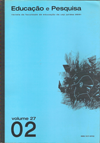The construction of literacy and illiteracy indexes: some issues
DOI:
https://doi.org/10.1590/S1517-97022001000200007Keywords:
Illiteracy, Literacy, Statistics, EvaluationAbstract
This article discusses issues on the construction of illiteracy - and of its opposite, literacy - indexes. Firstly, it analyzes the evolution of these concepts and their relevance to the field of education. Next it describes the Brazilian situation with respect to three strategies for measuring illiteracy and literacy: the population census, the evaluations of school systems, and the sampling studies. It analyzes methodological problems of each of those strategies, and their political and ideological implications. With regard to census data, it questions the validity of the criterion adopted by IBGE - less than four years of schooling - to quantify functional illiteracy. It points out the potential of the evaluations of school systems, showing their large repercussion in the media, and the little attention they receive from academic experts. With respect to sampling surveys, the article describes recent international trends and a pioneering initiative to create a national indicator of illiteracy in Brazil. The article underlines the importance of criticizing the myths associated to literacy and of avoiding the stigmas attached to illiteracy. The article concludes that the publication of researches on literacy and their distribution among the population represents a rich opportunity to the society to reflect on its own culture, and on its expectations about the school and other institutions.Downloads
Download data is not yet available.
Downloads
Published
2001-07-01
Issue
Section
Em Foco: Educação de Jovens e Adultos
License
Authors assume exclusive responsibility for the concepts expressed in their articles, which do not necessarily reflect the journal’s opinion.
Permission to photocopy all or part of the material published in the journal is granted provided that the original source of publication be assigned.
How to Cite
The construction of literacy and illiteracy indexes: some issues . (2001). Educação E Pesquisa, 27(2), 283-300. https://doi.org/10.1590/S1517-97022001000200007



